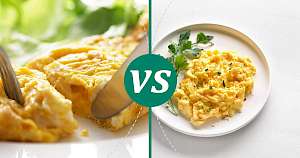Scrambled Eggs vs Omelette: Nutrition, Calories & Protein Compared


Scrambled egg vs Omelette
Nutrition Facts
Serving size:
change
5g10g15g20g30g40g50g60g80g100g120g140g160g180g200g220g250g300g350g400g450g500g600g700g800g900g1000g
1oz2oz3oz4oz5oz6oz7oz8oz10oz12oz15oz20oz25oz30oz35oz40oz50oz
Amount Per Serving:
Serving size:
change
5g10g15g20g30g40g50g60g80g100g120g140g160g180g200g220g250g300g350g400g450g500g600g700g800g900g1000g
1oz2oz3oz4oz5oz6oz7oz8oz10oz12oz15oz20oz25oz30oz35oz40oz50oz
Amount Per Serving:
Scrambled Egg vs Omelette 100g Compare
| per 100g | Scrambled eggs | Omelette |
|---|---|---|
| Calories | 149 | 149 |
| Fat | 10.98 g | 10.98 g |
| Protein | 9.99 g | 9.99 g |
| Calcium | 66 mg | 66 mg |
| Iron | 1.31 mg | 1.31 mg |
| Magnessium | 11 mg | 11 mg |
| Phosphorus | 165 mg | 165 mg |
| Potassium | 132 mg | 132 mg |
| Sodium | 145 mg | 145 mg |
| Zink | 1.04 mg | 1.04 mg |
| Vitaminium A | 161 µg | 161 µg |
| Vitaminium B3 (Niacin) | 0.076 mg | 0.076 mg |
| Vitaminium E | 1.15 mg | 1.15 mg |
| Vitaminium K | 4 µg | 4 µg |
A Delightful Journey from Scrambled Eggs to Omelette
Did you know that both scrambled eggs and omelettes have been a staple in breakfast menus around the globe for centuries? These egg-citing dishes not only offer a delicious start to your day but also come packed with a range of nutritional benefits. Despite their similar nutritional profiles, the textures, cooking methods, and versatility of scrambled eggs and omelettes set them apart. Let's embark on a delightful journey to explore these differences and discover which dish might suit your breakfast table the best.
Texture and Taste: A Dance of Delicacy
Scrambled eggs are known for their soft, creamy texture that melts in your mouth. Achieving the perfect scramble is an art, requiring a gentle hand to keep the eggs just on the edge of setting. On the other hand, omelettes offer a firmer bite, with a slightly browned exterior encasing a tender, fluffy interior. The omelette's versatility shines through the endless possibilities of fillings, from cheese and herbs to meats and vegetables, allowing for a personalized taste experience.
Cooking Techniques: Simplicity vs. Sophistication
When it comes to cooking, scrambled eggs boast simplicity. With just a pan and a spatula, you can whip up a comforting meal in minutes. The key is to cook them slowly over low heat, constantly stirring to achieve that coveted creamy texture. Omelettes, while not overly complicated, do require a bit more finesse. The challenge lies in mastering the fold or roll, ensuring the filling is perfectly encased within the egg. Whether you prefer the straightforwardness of scrambled eggs or the elegance of an omelette, both dishes offer a satisfying culinary adventure.
Nutritional Nuggets: More Alike Than You Think
Interestingly, scrambled eggs and omelettes share nearly identical nutritional profiles, each providing approximately 149 calories, 10.98 grams of fat, 9.99 grams of protein, and 1.39 grams of sugar per serving. They are also rich in vitamins and minerals such as calcium, iron, magnesium, phosphorus, potassium, sodium, zinc, vitamin A, and vitamin E. This makes both dishes an excellent choice for those seeking a balanced and nutritious meal. However, the true nutritional value can vary depending on the additional ingredients you choose to include, especially in omelettes.
Which One Wins the Breakfast Battle?
The decision between scrambled eggs and an omelette ultimately boils down to personal preference. If you're in the mood for something quick, comforting, and effortlessly delicious, scrambled eggs might be your go-to choice. However, if you're feeling creative and have a bit more time to spare, crafting an omelette with your favorite fillings could be a delightful way to start your day. Regardless of your choice, both dishes offer a nutritious and satisfying breakfast option that is sure to please any palate.
In the end, whether you lean towards the humble scramble or the filled omelette, both dishes celebrate the incredible versatility of eggs. So why not switch things up? Enjoy the creamy comfort of scrambled eggs one day and the filled delight of an omelette the next. After all, variety is the spice of life, especially when it comes to breakfast.
Scrambled eggs 100g
149kcalCalories source
- 0% CARBS.
- 29% PROTEIN
- 71% FAT
Omelette 100g
149kcalCalories source
- 0% CARBS
- 29% PROTEIN
- 71% FAT
Compares of scrambled egg
- Scrambled Egg vs Cottage Cheese
- Scrambled Egg vs Egg White
- Scrambled Egg vs Egg Yolk
- Scrambled Egg vs Fried Egg
- Scrambled Egg vs Boiled Egg
- Scrambled Egg vs Margarine
- see all compares of scrambled egg
Compares of omelette
- see all compares of omelette
Marcin Piotrowicz
calories-info.com creator
Healthy diet and healthy lifestyle promoter
Add comment